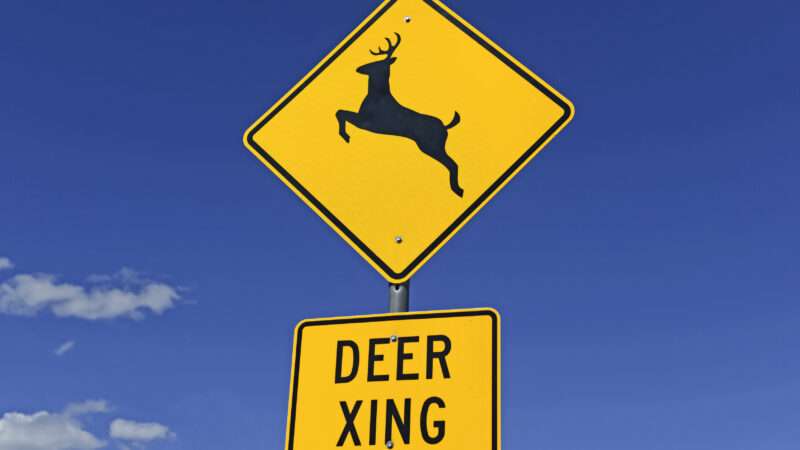
Thanks to record meat prices, a growing number of reports suggest Americans may have to eat less animal protein. Imagine, though, if an app existed that could help you locate free, fresh, tasty, and sustainable meat near you.
That's now the case in Wyoming, where a new mobile phone app feature "is helping get the meat from animals killed in fender benders from road to table and in the process making roads safer for critters," the Associated Press reported last week. "State wildlife and highway officials rolled out the app—possibly the first of its kind in the U.S.—this winter when Wyoming joined the 30 or so states that allow people to collect roadkill for food."
In my 2016 book Biting the Hands that Feed Us: How Fewer, Smarter Laws Would Make Our Food System More Sustainable, I note that a growing number of states had embraced the benefits of harvesting roadkill. Seventeen states then allowed the harvesting of roadkill. In a subsequent column on roadkill laws in 2017, I noted that that number had grown to include more than half of U.S. states. As last week's AP report notes, that number has continued to grow, with at least 30 states now allowing the harvesting of roadkill—with Wyoming one of the latest to do so.
The state's app facilitates legally harvesting animals—from bison to turkey and deer—that were accidentally killed on roadways. "For safety reasons, roadkill in Wyoming may not be collected after dark, along interstate highways[,] or in construction zones," the AP explains.
The new tool isn't a standalone roadkill app. Rather, the roadkill feature is housed within the state's 511 app, which provides residents with information on road conditions and traffic. The app works similarly to how apps like Google Maps or Waze do when it comes to reporting speed traps; it lets drivers who've hit an animal or noticed roadkill to geolocate and report the roadkill—even if they don't plan to harvest the animal. Other app users who may want to harvest roadkill can then use that data to locate and harvest the carcass.
As the AP explains, and this Wyoming YouTube tutorial details, the state also uses the geotagging feature in the app to help identify problem areas—places in the state where large numbers of critters are succumbing to vehicles. While harvesting roadkill helps make roads safer in the short term, the app's ability to help identify areas where large numbers of collisions occur could help make roads less dangerous on a permanent basis.
Despite these benefits, there's some pushback against harvesting and eating roadkill. But most of these arguments can be easily refuted. As I explained in a 2019 column, for example, the fears of a few that allowing the harvesting of roadkill will spur drivers to run down animals intentionally with their cars are somewhere between overblown and fantastical. A good rifle and a hunting permit cost a lot less than replacing a car that's been damaged or destroyed in a collision with, say, an elk. What's more, America's roads are already littered annually with millions of animal carcasses.
While other concerns appear similarly obtuse—such as the alleged risk of harvesting an animal that "might still be alive"—one entirely real concern about harvesting roadkill is that the animal could sicken or kill the eater due to spoilage. That's the reason Wyoming took so long to join the ranks of roadkill-legal states.
"In Wyoming, lawmakers introduced similar legislation in 2015 and 2017 but the bills failed to advance both times, due to strong opposition from the state's Game and Fish Department," NBC News reported in 2019. But there are steps people can take—ones that would be familiar to most hunters—to ensure the meat from a roadkill animal is likely safe to eat.
Niche food apps have changed the way we find, eat, and dispose of food. Over the past decade, mobile apps have helped address and amplify Americans' interest in everything from food trucks to foraging, and underground supper clubs to combating food waste. If it's successful and spreads beyond the state's borders, Wyoming's new app could be a game changer that helps normalize eating roadkill.
The post Got Roadkill? Now There's an App for That appeared first on Reason.com.







